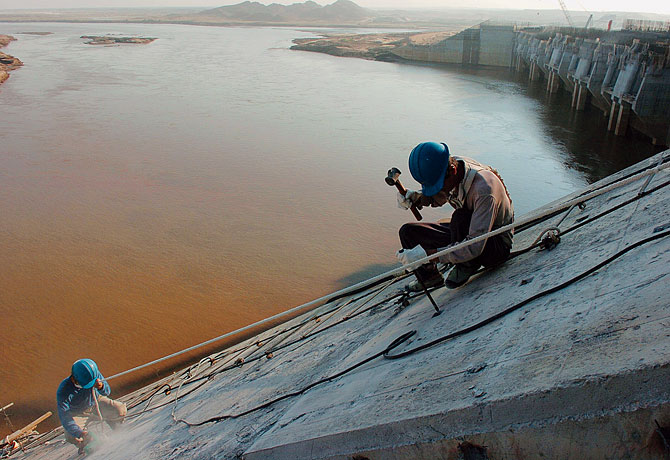
Help from afar
Chinese laborers work on Sudan's Merowe Dam, built by a Chinese company, in 2007
(2 of 2)
Africa's exceptional vulnerability to economic cycles is something activists were hoping could be reduced with a concerted effort by the world's wealthy countries. The continent requires a giant infusion of money — far more than rich governments will fund — in order to build bridges, roads, electricity grids and ports, which Africa desperately needs to increase its exports and expand trade. Some of those needs have been filled not from G-8 aid, but by China, which has cut huge infrastructure deals across Africa in exchange for rights to minerals and oil. There are still gaping holes, however. Overhauling Africa's infrastructure could cost $1 trillion over the next decade, according to Vivien Foster, a World Bank expert. Progress is being made. Investors sunk about $30.6 billion into sub-Saharan Africa last year. And despite the slowdown, foreign investment is still set to increase about 16.8% this year, according to the Organization for Economic Cooperation and Development.
Far more is needed. Africa accounted for a miniscule 1.7% of foreign investment worldwide in 2007, according to U.N. statistics. And as global credit has dried up and investors have run scared, scores of projects have stalled or been canceled across the continent, according to the World Bank's International Finance Corporation. Arcelor Mittal, for example, has frozen a $1.5 billion project in Liberia to build rail and port facilities in exchange for iron ore, because the company has not been able to find financing, according to Steven Radelet, senior fellow at the Center for Global Development in Washington, D.C. Similarly, a $3.3 billion Chinese project to build cement plants in Nigeria has stalled, as has a Chinese project in the Democratic Republic of Congo to build infrastructure in exchange for minerals, due to financing restrictions faced by African governments. "Investors look at Africa and think this isn't the time to do anything even slightly risky," says Radelet.
There is a certain irony to this perception, considering the fact that developing Africa is in many ways a more promising place to do business right now than the recession-wracked developed world. At the World Economic Forum for Africa in Cape Town last month, executives said they earn far higher profits in Africa than elsewhere, in part because the inability of most African countries to raise funds on capital markets has shielded them from the full blast of the global credit crisis. "There is a huge amount of energy and potential for growth in Africa," says Graham Mackay, CEO for multinational brewer SABMiller, adding that of the company's 10 newest plants, the four in Africa are the most profitable. "It is not by any means doom and gloom."
That gulf in views about Africa — whether the continent is a rich business opportunity or a basket case needing handouts — underlies a controversy raging these days among aid officials and politicians: Is aid to Africa money well spent? In contrast to the disaster warnings from officials like Zoellick, some argue that nearly $1 trillion in Western aid to Africa during the past 50 years has left its leaders dependent and unmotivated to make changes necessary for sustainable economic progress. "African governments view aid as a permanent income flow, and rightfully so, since no one has ever said there is an exit date," says Zambian economist Dambisa Moyo, whose book Dead Aid, published earlier this year, argues that if Western assistance focused on emergencies, rather than development, African leaders would be forced to rebuild their shaky economic foundations. Steps that ought to be taken include streamlining cumbersome bureaucracies (it takes months to start a business in many African countries) and cracking down on corruption, which the African Union estimates costs the continent about $150 billion a year. By daring to question Africa's worthiness, Moyo has ignited a firestorm of debate among African and Western officials, some of whom have long blamed shortcomings on Africa's lack of clout in organizations like the IMF and the G-8. African leaders are far from blameless, says Rwanda's President Paul Kagame, whose country has received billions in Western aid. He wrote in the Financial Times in May that aid has made Africans "unstable, distracted and more dependent." Moyo agrees. "If Africa knew there was a time when aid would stop, it would jump-start them into making changes," she says. "Somebody has to pull the trigger."
Don't expect to hear that firing gun at the G-8 summit in Italy, though. Aid activists say they will vigorously protest the group's failure to meet its target for additional aid funds. And G-8 leaders, including U.S. President Barack Obama — who plans to fly to Ghana from the summit — say they intend to maintain aid levels, despite the recession. Indeed, such support remains crucial in many parts of Africa — and will probably remain so for many years. For Diakité, the chief in Mali, funds from industrialized countries can mean the difference between survival or death for some people in his village, who rely upon donations of nutritional supplements and mosquito netting. And that is no small consideration when rich leaders sit down to calculate their responsibility to the world's poorest people.
— with reporting by Alex Perry / Cape Town